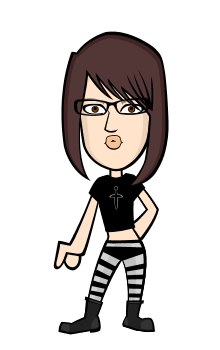What is chorus?
A group of people assembled to sing together
OR
A large organized group of singers. One that performs together with an orchestra or opera company.or
A Chorus is produced when several musicians are playing simultaneously, but inevitably with small changes in the amplitudes and timings between each individual sound.In music the word "chorus" has three meanings: a group of performers, music for a group of singers and the part of a song that is repeated after a verse.
Explanation of chorus:
The Chorus is a group of actors that together speak, sing, and dance in one body. The Chorus ispart ritual part thematic device that play a much larger role in Greek Tragedy than in the other genres.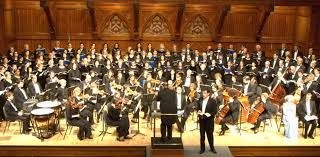
A classic Greek chorus consisted of a number of identically dressed men who served as
observers and commentators during the course of a play. They fulfilled several vital functions which helped influence the development of Greek drama.A Greek chorus could number as many as 50 people, but Sophocles set its number at 15.There were originally 12 chorus members all male but Sophocles added 3 more to make it 15. One of the primary functions of the chorus is to provide atmosphere and, in some ways, underscorethe tragic action. When the hero is treading upon major conflict or leading us into the risingaction of the plot, the chorus, in a way, is heralders of inevitable disaster and instill a sense of fear or suspense in the audience. In some ways the Chorus can represent the audience's idealresponse to the play. Chorus, and its chants and songs, helped the audience better connectwith the character, revealing the essence of the tragedy. Greek choruses served to provide the viewers with plot exposition, essentially acting as narrators for many parts of the drama.
What are the functions of chorus in 'Oedipus Rex'?
1) To entertain the audience.2) To enhance the workings of the plot.3) To explain the characters and events.These are the functions of chorus in "Oedipus Rex" by Sophocles
Detail about chorus:
Like most all ancient Greek tragedians, Sophocles divides his choral odes into strophe and anti strophe. Both sections had the same number of lines and metrical pattern. In Greek,strophe means "turn," and anti strophe means "turn back." This makes sense when you considerthe fact that, during the strophe choruses danced from right to left and during the antistrophethey did the opposite. Sophocles may have split them into two groups, so that it was as if one part of the Chorus was conversing with the other. Perhaps the dualities created by strophe andantistrophe, represent the endless, irresolvable debates for which Greek tragedy is famous.Specifically, the chorus in a Greek play is made up of dancers and singers. These dancers and singers represent a chorus of Theban elders. As dancers and singers, they signal the end of one episode or scene and the beginning of another. That signaled interlude between episodes orscenes is called the stasimon.
Contribution of chorus to Oedipus Rex: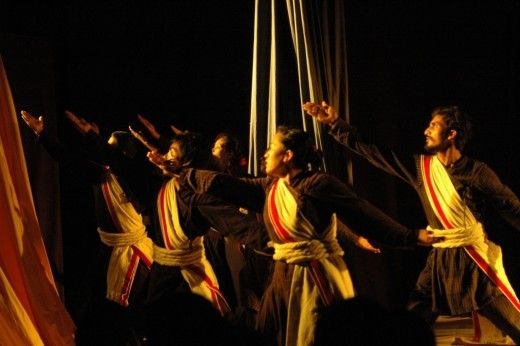
The contribution of the Chorus in Oedipus Rex is considerable. They link the play with common humanity. In some sense they are often in the position of the ideal spectator. They fill in thegaps in the action when no other character is there on the stage. They add to it the element of melody which must have been one of the attractions of Greek tragedy. They provide an appropriate shift between the titanic, heroic figure of Oedipus and the mass of common humanity represented by the two shepherds in Oedipus Res. The tragedy of Oedipus and itsrelevance to common life is very well stressed by the Chorus in its exit ode or exode.The Chorus takes part in the dialogues also. When Oedipus consults them about ending theplague in the city, they express disappointment that the oracle had not guided them about the
identity of Laius’ murderer. They also tell him what they know about the murder of their
previous king and its circumstances. When Creon, learning that the king has accused him of treason, comes on the stage he talks to the Chorus,
who tell him that the king’s accusation was
probably made in the heat of anger. Creon asked if the king looked absolutely serious whilemaking the charge and they rightly say that it is not for them to look into the eyes of his masterwhen he speaks. When Oedipus has almost passed a sentence upon Creon, Jocasta arrives onthe scene and first talks to the Chorus. They request her to settle the difference between thetwo men. They are worried when they see Jocasta going into the palace in a very dejectedmood, and they give expression to their apprehension. Oedipus asks them about the shepherdwho gave the infant to the Corinthian, they answer that his queen would be able to answer thequestion better. They sympathize with Oedipus when they see him after he has blinded himself.It is clear, thus, that the Chorus never takes a direct hand in the action. It does not consist onlyof spectators but influences the action in various subtle ways.
Chorus with reference to OEDIPUS REX: 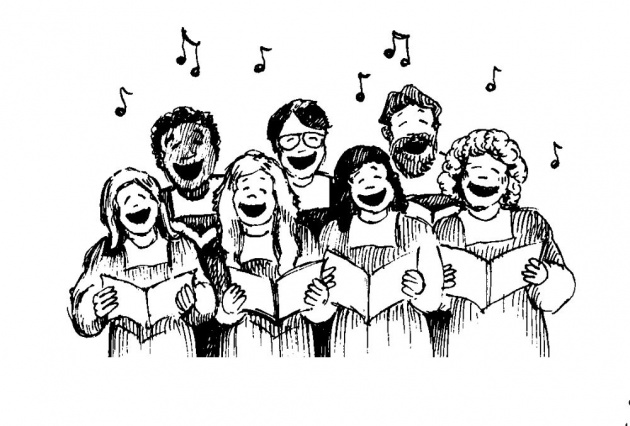
Sophocles also uses the Chorus at the beginning of the play to help tell the audience the given circumstances of the play. We hear all about the terrible havoc that the plague is wreaking onThebes. By describing the devastation in such gruesome detail, Sophocles raises the stakes forhis protagonist, Oedipus. The people of Thebes are in serious trouble; Oedipus has to figure outwho killed Laius fast, or he won't have any subjects left to rule.Unlike his contemporary Euripides, Sophocles was known to integrate his choruses into theaction of the play. In Oedipus the King we see the Chorus constantly advising Oedipus to keep his cool. Most of the time in ancient tragedies choruses do a lot of lamenting of terrible events,but do little to stop them. Amazingly, though, the Chorus in Oedipus the King manages toconvince Oedipus not to banish or execute Creon. Just imagine how much worse Oedipuswould have felt if he'd killed his uncle/brother-in-law on top of his other atrocities.The Chorus in Oedipus the King goes through a distinct character arc. They begin by beingsupportive of Oedipus, believing, based on his past successes, that he's the right man to fix theirwoes. As Oedipus's behavior becomes more erratic, they become uncertain and question hismotives. The fact Oedipus doesn't start lopping off heads at this point is pretty good evidencethat he's not a tyrant. In the end, the Chorus is on Oedipus's side again and laments his horrificfate.During their interludes, the dancers and singers move and sing through their parts. But thatdoes not mean that chorus members lack regular, non-singing parts. In fact, the chorus has adesignated choir leader who additionally has spoken interactions with other characters in theplay. Through the sung parts of the entire chorus and the spoken parts of the chorus leader, thechorus carries out an additional responsibility to the reading and viewing audience. They comment on characters and situations as these characters appear and as these situations develop in the play.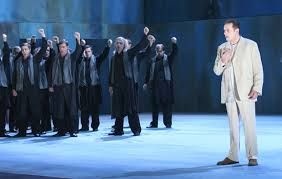
Conclusion:
The functions of the Chorus are very well performed in Oedipus Rex. In the very first ode theChorus depicts the horror of the plague and expresses an apprehension about the messagefrom the oracle of Delphi. Other odes comment on the action that has taken place after the lastode and build an atmosphere appropriate to that stage of the play. It plays the role of a peace-
maker between the king and Creon and succeeds in getting the king’s pardon for the latter.
After the exit of Teiresias it comments on the terrible predictions which Teiresias has made butshows determination to support the king. Its most significant response is when Oedipus andJocasta have expressed irreverent thoughts against the oracles. At many other times also theyreflect the dominant mood and help to deepen it. When Oedipus imagines that he is the son of the goodness of luck, the Chorus, immediately sing that their master, Oedipus, might be the son of Apollo. So all in all, chorus has an important role in drama and it has importance like soul in body.
The role of Chorus in Oedipus Rex
Posted on at

